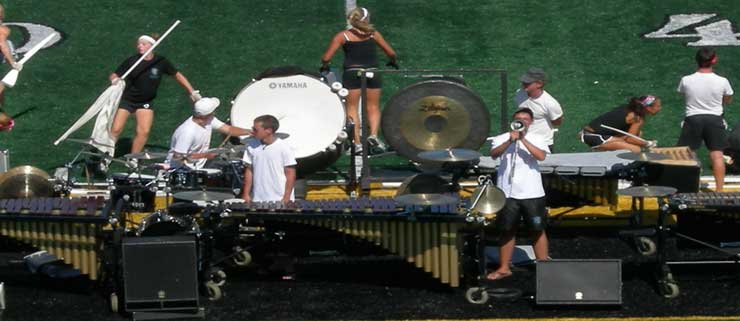 This document presents a brief biography of Mozart including his early childhood, travels, and demise in 1791.
This document presents a brief biography of Mozart including his early childhood, travels, and demise in 1791.
{mosimage} Born in 1756, Wolfgang Amadeus Mozart was the second child in the family of Leopold Mozart of Salzburg, Austria. Like his older sister Marian he showed great musical talent beginning at a very young age. One day at age three, as his father concluded a piano lesson with his sister young Wolfgang walked over to the piano and began to play back the lessons that had just been taught to his older sibling. This event brought his father to begin active music instruction with Wolfgang, and within a year he was already an accomplished pianist. By age five he began to compose pieces of music for the piano , with his father writing down the notes as he played them. Eventually Wolfgang learned to write music notation and his writing flourished. One day he told his father that he was writing a concerto. After looking at the manuscript his father was quoted as saying, "It is a pity it can not be made use of. It is so difficult that no one could play it." His son replied, "It is a concerto, and must be studied till it can be played properly." Wolfgang then walked to the piano and played it.
Mozart's Life and Experiences Across Europe:
No biography of Mozart would be complete without speaking of the family's extensive travels throughout Europe. As is still the custom even in modern times, the prolific Mozart family traveled extensively throughout Austria, Germany, Italy, and England beginning in 1762 when Wolfgang was only six years old. A year later he was playing for Louis XV in Versailles where he played with young Marie Antoinette. In1764 they moved to London where Wolfgang met Johann Christian Bach and was inspired to write his first three symphonies, still only at age eight. In the coming years the family continued performing during three trips to Rome, Italy, and Milan , and later to Vienna again in 1773 where he met Joseph Haydn. A later trip took him to Paris where his mother took ill and passed away in July of 1778. In 1780 Mozart presented his first major Opera, Idomeneo , in Munich.
Attempting to Fill His Father's Shoes:
By 1779 much had changed in Wolfgang Amadeus Mozart's home town. His father, who had been Kappelmeister for the Archbishop of Salzburg had always hoped that Wolfgang would one day hold the post as he had. At this time in history musicians fiercely sought after court positions such as this as they promised a steady flow of income. Over the years, however the Archbishop of Leopold's time had been replaced by a different priest. This new Archbishop and Wolfgang did not get along, and in 1780 following an argument, Wolfgang resigned and was forcibly thrown out of the Archbishop's residence. This signaled the beginning of Mozart's financial decline. While his compositions during this period are some of his most admired, they did not secure financial success.
What Do We Know About The Death of Mozart?
In July of 1791, Mozart was hired to write a Requiem (a mass for the dead). At this time Mozart was deep in debt and had taken ill. In his feverous state some say that Mozart believed the man who commissioned the work was Death himself, and that the Requiem he was writing was to be his own. In the end, Wolfgang Amadeus Mozart never completed this Requiem. Speculation that Mozart had been murdered by a rival musician named Antonio Salieri has, over time, proven to be false. Wolfgang Amadeus Mozart, perhaps the most perfect musical mind ever to put quill to paper, died penniless and forgotten as a casualty of Rheumatic Fever and was buried in an unmarked grave on December 5th, 1791. Despite his quiet demise, well over 600 of his works survive to this day.
References Used In This Biography of Mozart:
Scobey, Katherine Lois and Horne, Olive Brown (1905) Stories of Great Musicians. American Book Company: New York
Kerman, Joseph (1992) Listen. Worth Publishers:New York







 Scroll down to view the comparison chart of over a dozen different portable digital audio recorders.
Scroll down to view the comparison chart of over a dozen different portable digital audio recorders.